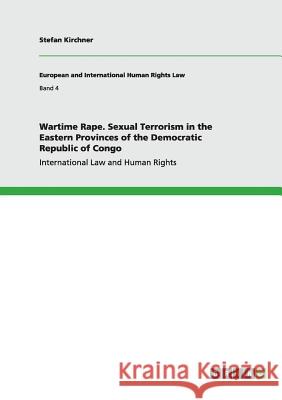Wartime Rape. Sexual Terrorism in the Eastern Provinces of the Democratic Republic of Congo: International Law and Human Rights » książka
Wartime Rape. Sexual Terrorism in the Eastern Provinces of the Democratic Republic of Congo: International Law and Human Rights
ISBN-13: 9783640212590 / Angielski / Miękka / 2008 / 268 str.
Wartime Rape. Sexual Terrorism in the Eastern Provinces of the Democratic Republic of Congo: International Law and Human Rights
ISBN-13: 9783640212590 / Angielski / Miękka / 2008 / 268 str.
(netto: 506,89 VAT: 5%)
Najniższa cena z 30 dni: 529,33
ok. 16-18 dni roboczych
Bez gwarancji dostawy przed świętami
Darmowa dostawa!
Document from the year 2008 in the subject Law - European and International Law, Intellectual Properties, Universite Paris-Sorbonne (Paris IV), 81 entries in the bibliography, language: English, comment: The author is admitted to the bar in Germany and specializes in international law and human rights. He currently teaches at the University of Gottingen. The boolk is based on a presentation given by the author at Sorbonne University, Paris, and includes a large collection of background materials.The author is admitted to the bar in Germany and specializes in international law and human rights. He currently teaches at the University of Gottingen. The boolk is based on a presentation given by the author at Sorbonne University, Paris, and includes a large collection of background materials., abstract: About 5.4 million people have been killed in the wars in the Democratic Republic of Congo (D.R.C.), the former Zaire. 45,000 die every month and hundreds of thousands of women have been raped here in recent years. Wartime rapes are anything but new and have been employed not only to terrorize the population but also as weapon of genocide in Rwanda, Bosnia and Darfur. The Eastern Congolese provinces of North and South Kivu have been affected by particular gruesome acts of violence and thousands of victims suffer from rape-induced fistulae, ruptures of the walls which separate the victim's vagina from her rectum. According to UN staff and doctors in the region, all armed groups in the region are involved in rapes and despite the 2002 Pretoria Accord which put an official end to the war, attacks and rapes continue to this very day. Many survivors are forced out of their homes and their families abandoned and left to fend for themselves. Therefore, apart from medical treatment and psychological counseling, there is a strong demand for justice. But due to the weak position of women in Congolese society, justice is much harder to get by than medical treatment. Although the C











